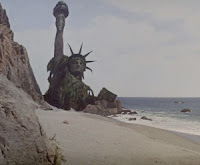A scenario where Filipinos can aspire to world domination
 Our minds are wired by millions of years of evolution to react to vermin with very primal -- often reflexive -- responses. Not only do we recoil in horror at the sight of decomposing biological matter our other senses are exquisitely attuned to detecting evidence of vermin infestation -- the smell of rotting flesh elicits the gagging sensation, bitter tastes repel us, touching something slimy or squishy disgusts us. All of the chemical agents that oppress our senses are the products of decomposition caused by vermin (of both the microbial and multi-celled varieties).
Our minds are wired by millions of years of evolution to react to vermin with very primal -- often reflexive -- responses. Not only do we recoil in horror at the sight of decomposing biological matter our other senses are exquisitely attuned to detecting evidence of vermin infestation -- the smell of rotting flesh elicits the gagging sensation, bitter tastes repel us, touching something slimy or squishy disgusts us. All of the chemical agents that oppress our senses are the products of decomposition caused by vermin (of both the microbial and multi-celled varieties).Vermin outnumber humans in the millions to one. They infest every nook and cranny of every form and aspect of human habitation. Some of them are essential to our survival -- they aid digestion and decompose our toxic waste products into forms that can be recycled by natural processes. Others pose immediate threats to us. They carry disease and transmit them to us. Many feed on and, in so doing, degrade our food. Still others ruin what we build simply by making their homes within them. As such we are not only repelled or offended by evidence of their work, we also directly find their existence disturbing if not objectionable.
Whether their contribution to human interests is a plus or minus, vermin have one thing in common. They are alien to us. In short, nature has ingrained in our psyche a deep instinct to find discomfort in both direct and indirect evidence of alien habitation within our personal spaces.
In this way, I contextualise what was initially something vaguely disturbing about the following snippet coming from Roberto de Ocampo's recent article on the Inquirer.net, "The Chosen People"...
Great masses of Filipinos cover the entire park of Central Hong Kong and the famed Spanish steps in Rome every Sunday.
Perhaps, Filipinos are indeed the "Chosen People" as de Ocampo asserts. Our ability to multiply at rates far beyond replacement levels, makes us collectively immune to practically anything that nature might throw at us.
Our fragility as a species has supposedly come to light in the aftermath of a raft of recent disasters -- the earthquakes and floods that devastated Christchurch in New Zealand, large swaths of coastal and inland towns and cities in Queensland, Australia, and most recently Japan. Less tangible but even more far reaching are the impacts to entire ways of life by financial collapses, and the catastrophes (both immediate and drawn-out) caused by our ever-growing demand for energy-dense fuels like petroleum and radioactive minerals. But this "fragility" is in the context of the large-scale structures of civilisation advanced societies had built -- complex supply chains, vast economic interdependencies, and intricate works of engineering are all designed under the premise of acceptable risk. The combination of factors that contributed to the failure of the cooling systems in the nuclear facilities currently in peril in Japan was deemed a highly unlikely scenario at a time these systems were designed. Financial systems operate under the dubious premise of limitless "growth" deemed "likely" by "economists".
Filipinos on the other hand lack any such systems and any such structures at the scale found in advanced societies like Japan. Tens of thousands of Filipino lives are needlessly lost and millions wasted in impoverishment every year because of a lack of these advanced structures of civilisation. Yet, as de Ocampo observes, the prospect of Filipinos engulfing the planet with our sheer numbers is not such a farfetched scenario. From a purely Darwinian perspective, we can be considered to be a successful strain of humans in the same way that a relatively mindless mass of microbes can bring an elephant to its grave.
Observes de Ocampo further...
The 2011 fertility rate estimate for Spain is 1.47, Italy 1.39, UK 1.91, France 1.96 and Germany 1.41, to name a select few. The average fertility rate of all Western Europe is about 1.5. In short, these nations are either on are perilously close to what population experts call an irreversible demographic decline. To put it more starkly, for example, by 2020 (or just nine years from now) more than half of all births in a country like, say, the Netherlands (1.66 fertility rate) will be of non-European Dutch origin. Furthermore, with the birth rate dropping below replacement, the population of such countries ages and the problems facing an aging population are numerous and startling enough to deserve a separate treatise.
Humans will persist. Perhaps not in the form Western-set standards of civilised living currently describe. But we as a species will probably be around for a long time, maybe even in a post-technological world. Such will be a world where Filipinos will have a legitimate claim to world domination.




Insightful inciteful article.
ReplyDeleteAs for Prince William and Katie from that other thread, never has so much pomp been so absolutely boring. I don't know, they seem overly confined within their propriety, so there is no pizzaz for me. Give me a tape of Janis Joplin any day . . .
just like cockroaches, no?
ReplyDeleteI have ironically come to believe that it can only take a wide-ranging natural disaster or something to that effect that actually affects the entire nation that will finally get the Filipino people to make changes for the better.
ReplyDeletePardon my German, but I'm reminded of the article about the Bangladeshi villagers realizing they're eating their own shit to get them to stop open defecation. The Filipino society as a whole already know they're shoveling it in their collective mouths, and they either don't care or believe the only thing they can do is season the shit to make it taste better. But it's still shit they're eating.
They're going to have to be pushed to the brink of death from the kind of diseases that one can get from eating fecal matter before they realize they should really stop eating it.
Idiot peryodikos and idiot peryodista spreading horse puckee to prove their
ReplyDeleterot superiority in thinking to all
Penoys subscription. It is the best
sample of Penoys meant rationale dahil "Kulang Sa Pansin"-ADD, and because there is no good organic products coming out of the Pinas that warrants quality,
so they then compensate through the
spread of yabangs in mass quantity. They reinvent the mousetrap to further the usual tethering method by pseudomonad science, id est, talagang parasite. Basillus-Sophist is native to da Pinas.
The bonehead twit even latch the lot of Penoys to the Bible - talagang suwapang
ReplyDeleteganid pa and what is next, Penoys the
lost tribe daw of Israel?
"From a purely Darwinian perspective, we can be considered to be a successful strain of humans in the same way that a relatively mindless mass of microbes can bring an elephant to its grave."
ReplyDeleteOne of your best lines of penmanship ever.
@The Lazzo: In the case of the Bangladeshi villagers you cite (referring to this article, presumably), they did not even need to be pushed to the brink. They just needed to be shown in a map how the overall layout of their water supply paints a bleak picture of their sanitation situation and how it contributes to the spread of disease in their community.
ReplyDelete@The Society of Honor: Thanks. :-) Quite confronting, isn't it?
I have a friend who thinks plans for World Domination by Philippines are already well advanced. The mechanism is the widespread employment of Filipina helpers, nannies and yayas to the rich and famous. Even now the offspring of leaders of the most important nations are being schooled in the delicacies of balut and aso, the infallibility of the Roman Catholic faith and the pleasures of videoke. Wait until the infants of Prince William and Katie start yelling "Happy! Yippee! Yehey!"
ReplyDeleteHow does that saying go?
ReplyDelete"The Hand That Rocks The Cradle Is The Hand That Rules The World", is it?
We will dominate the world with OFW Slaves....in ancient Rome...slaves were more numerous than their Roman masters.
ReplyDelete